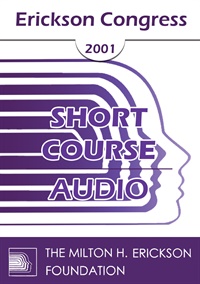IC01 Short Course 25 - Ways to Treat Pain and Anxiety - Christine Guilloux, DESS Psychol.
- Average Rating:
- Not yet rated
- Topic Areas:
- Short Courses | Anxiety | Pain and Healing
- Categories:
- Erickson Congress 2001 | Erickson Congress
- Faculty:
- Christine Guilloux, DESS Psychology
- Duration:
- 1:12:28
- Format:
- Audio Only
- Original Program Date:
- Dec 06, 2001
- License:
- Never Expires.
Description
Description:
After redefining the notion of dissociation, this workshop will provide examples of techniques for changing a client's habitual way of thinking, feeling, behaving and experiencing his/her pain; helping him/her transform it and/or make it disappear. These techniques apply to "imaginary" pain, chronic or recurring pain and to anxiety experienced with pain. Illustrations and comments will be given through case examples.
Educational Objectives:
- To describe the utilization of dissociation as a mechanism for change.
- To list techniques to be used to transform the sensation of pain or to make it disappear.
*Sessions may be edited for content and to preserve confidentiality*
Credits
Faculty

Christine Guilloux, DESS Psychology Related Seminars and Products
The psychotherapeutic foundations of Christine Guilloux, beyond her clinical social psychology curriculum, are Ericksonian hypnosis and systemic therapy at the Palo Alto School, enriched notably by other approaches such as EMDR, somatic experiencing (SE), narrative approaches and energy psychology. She runs workshops and seminars in hypnosis and integrative therapy with healthcare professionals in France and abroad. The practitioner is also a lecturer in narrative medicine at the Université René Descartes in Paris. Its "global" approach allows it to take into account your suffering, your troubles in their context and to take into consideration the interactions with your environment (family, couple, work). She welcomes teenagers, adults and families. She accompanies you on anxiety disorders, phobias, obsessions, stress-related disorders, work-related suffering, time management, difficulty concentrating, lack of self-confidence, post-traumatic stress, sleep disorders, relationship difficulties and communication.


